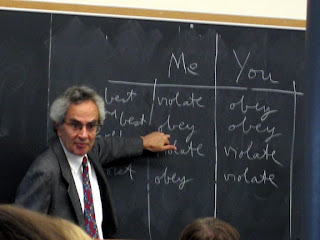Thomas Nagel is professor at NYU and author of Mind and Cosmos: Why the Materialist Neo-Darwinian Conception of Nature Is Almost Certainly False. He has the gall (or courage, as it were) to break with the philosophical naturalism (materialism) held by many modern evolutionists...
Excerpts below are from "The Heretic: Who is Thomas Nagel and why are so many of his fellow academics condemning him?" by Andrew Ferguson in The Weekly Standard.
"...when it comes to cosmology, scientists are just as likely to make an error of philosophy as philosophers are to make an error of science."
"As a philosophy of everything [naturalism] is an undeniable drag. As a way of life it would be even worse. Fortunately, materialism is never translated into life as it’s lived. As colleagues and friends, husbands and mothers, wives and fathers, sons and daughters, materialists never put their money where their mouth is. Nobody thinks his daughter is just molecules in motion and nothing but; nobody thinks the Holocaust was evil, but only in a relative, provisional sense. A materialist who lived his life according to his professed convictions—understanding himself to have no moral agency at all, seeing his friends and enemies and family as genetically determined robots—wouldn't just be a materialist: He’d be a psychopath."
[Nagel writes...] “I want atheism to be true and am made uneasy by the fact that some of the most intelligent and well-informed people I know are religious believers. It isn't just that I don’t believe in God and, naturally, hope that I’m right in my belief. It’s that I hope there is no God! I don’t want there to be a God; I don’t want the universe to be like that.”
"Nagel believes this 'cosmic authority problem' is widely shared among intellectuals, and I believe him. It accounts for the stubbornness with which they cling to materialism—and for the hostility that greets an intellectual who starts to wander off from the herd. Materialism must be true because it 'liberates us from religion.'”
Nagel is seeking to come up with a third way between materialism and theism. It may end up being pantheism of some sort, as he postulates that perhaps something within matter (some inherent property) may cause it to produce life. This, of course, is a worldview choice made primarily on faith.
Read the full article here.

Comments